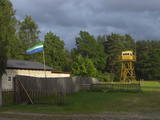“The Wind. The Spite. The Liv Flag” (excerpt) - Ghost ships and barbed wire
I am told that prior to World War II, there were 48 fishing boats in Mazirbe. Then came the Soviet regime with its desire to destroy and to damage. The strict order: Burn the boats!
“But the Livs are spiteful,” says Gunta. “They didn’t burn the boats. They just brought them deeper inland with the thought that sooner or later, after all, the occupants would be leaving. Everyone hoped that the British would come to help, and Latvia would be free again.”
The years of the Soviet occupation have left behind harsh tracks, it turns out. As I turn down a forest trail, I suddenly see several fishing boats that have all but disappeared among the trees and the earth. They are wrecks, they are ghost ships and shadows of the past. They are half-collapsed, but it seems that they are still trying to maintain nobility and spite, even though they have no more strength. I am told that prior to World War II, there were 48 fishing boats in Mazirbe. Then came the Soviet regime with its desire to destroy and to damage. The strict order: Burn the boats!
“But the Livs are spiteful,” says Gunta. “They didn’t burn the boats. They just brought them deeper inland with the thought that sooner or later, after all, the occupants would be leaving. Everyone hoped that the British would come to help, and Latvia would be free again.” Historical sources tell us that the boat cemetery emerged after 1960, because border guards refused to let people burn the boats on the beach on Summer Solstice eve – something that had been traditional in the past for boats that were past their prime. And so the boats were left there. Decades passed, trees grew around the boats. These ghostly wrecks offer such expressive evidence of the times that official historical texts pale before them.
If we’re talking about the absurd prohibitions that existed during the Soviet era, then we also have to mention the fact that the sea was not “open” to everyone. Fishermen who lived near the coast were given norms. A regime of passes was implemented, and the ancient traditions of mariners were destroyed. Each evening the beach was harrowed with the help of horses and, later, tractors. The point was to find footprints if someone decided to flee across the sea to Sweden, which was “rotting because of capitalism.” All that was open was a zone of the beach that was approximately 200 metres wide. It was bordered by barbed wire on both sides, and border guards and their dogs patrolled the area. There was a sign: “Stop! The beach is closed from 10:00 PM.”
Did the Soviet regime really think that someone was going to try to flee to Sweden by crossing the sea? How silly,” says Gunta. “No one tried to flee. In the first years after the war – yes, but later no one had any such thoughts.” She adds that she and other children in the village lived the lives of children, didn’t think much about adult matters, and couldn’t say that the childhood was really bad. Perhaps it was not as sunny as it might have been somewhere else and at a different time, but it was nice enough to remember it warmly. Sure, there was poverty, but wasn’t that true all over? Mazirbe had a fishing kolkhoz and an ordinary agricultural kolkhoz. As was common in the Soviet era, there was nothing much in the stores. There were shortages of everything. Girls in the village could only dream of elegant gowns. They had to be very creative in making dresses out of whatever was available. A sewing machine was a true treasure. “My mama knew how to sew,” Gunta says with a sparkle in her eye. “That was worth a lot. She sewed me a dress for school from father’s old suit coat. Ladies sewed dresses from feathers that were meant for pillows – pink, blue and orange. Oh, and if someone got some calico! Of course, we wore the same dresses all summer long.” There were parties at the Liv Cultural Centre. Very popular were parties with a show programme and dancing – such parties were held all over the Soviet Union. Soldiers from the military unit in Mazirbe came to the parties, as well, of course. “We almost had to beat them off with a stick,” Gunta laughs. Did they marry the local girls? “Absolutely. Nearly all of the girls found husbands like that – Russians, Lithuanians, some Latvians. There were fairly few civilians and local men.”
“But the Livs are spiteful,” says Gunta. “They didn’t burn the boats. They just brought them deeper inland with the thought that sooner or later, after all, the occupants would be leaving. Everyone hoped that the British would come to help, and Latvia would be free again.” Historical sources tell us that the boat cemetery emerged after 1960, because border guards refused to let people burn the boats on the beach on Summer Solstice eve – something that had been traditional in the past for boats that were past their prime. And so the boats were left there. Decades passed, trees grew around the boats. These ghostly wrecks offer such expressive evidence of the times that official historical texts pale before them.
If we’re talking about the absurd prohibitions that existed during the Soviet era, then we also have to mention the fact that the sea was not “open” to everyone. Fishermen who lived near the coast were given norms. A regime of passes was implemented, and the ancient traditions of mariners were destroyed. Each evening the beach was harrowed with the help of horses and, later, tractors. The point was to find footprints if someone decided to flee across the sea to Sweden, which was “rotting because of capitalism.” All that was open was a zone of the beach that was approximately 200 metres wide. It was bordered by barbed wire on both sides, and border guards and their dogs patrolled the area. There was a sign: “Stop! The beach is closed from 10:00 PM.”
Did the Soviet regime really think that someone was going to try to flee to Sweden by crossing the sea? How silly,” says Gunta. “No one tried to flee. In the first years after the war – yes, but later no one had any such thoughts.” She adds that she and other children in the village lived the lives of children, didn’t think much about adult matters, and couldn’t say that the childhood was really bad. Perhaps it was not as sunny as it might have been somewhere else and at a different time, but it was nice enough to remember it warmly. Sure, there was poverty, but wasn’t that true all over? Mazirbe had a fishing kolkhoz and an ordinary agricultural kolkhoz. As was common in the Soviet era, there was nothing much in the stores. There were shortages of everything. Girls in the village could only dream of elegant gowns. They had to be very creative in making dresses out of whatever was available. A sewing machine was a true treasure. “My mama knew how to sew,” Gunta says with a sparkle in her eye. “That was worth a lot. She sewed me a dress for school from father’s old suit coat. Ladies sewed dresses from feathers that were meant for pillows – pink, blue and orange. Oh, and if someone got some calico! Of course, we wore the same dresses all summer long.” There were parties at the Liv Cultural Centre. Very popular were parties with a show programme and dancing – such parties were held all over the Soviet Union. Soldiers from the military unit in Mazirbe came to the parties, as well, of course. “We almost had to beat them off with a stick,” Gunta laughs. Did they marry the local girls? “Absolutely. Nearly all of the girls found husbands like that – Russians, Lithuanians, some Latvians. There were fairly few civilians and local men.”
| Tourism objects involved in this story | ||
|---|---|---|
Der Posten der Küstengrenzwache befindet sich in der ehemaligen Seefahrtschule. In der nachsowjetischen Zeit wurden in den einzelnen Räumen der Gebäude Übernachtungsmöglichkeiten angeboten. Der Turm der Grenzwache ist einer von den am besten erhaltenen Objekten solcher Art am Strand. |
||









